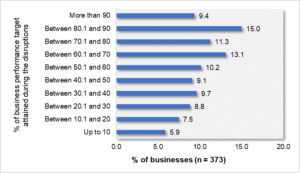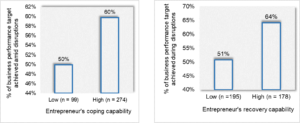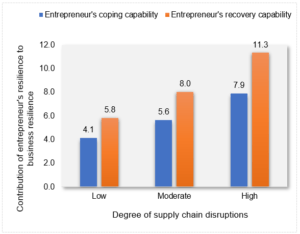Key highlights
- Businesses led by women are engines of socio-economic well-being, particularly in developing societies where a significant proportion of women’s income goes to support families.
- Supply chain disruptions can disproportionally undermine the performance and survival of businesses owned and managed by women.
- Large-scale data from several agricultural supply chains in Ghana show that businesses led by resilient women are more likely to prosper during supply chain disruptions.
- The Ghanaian society should, therefore, embrace and promote cultural values and norms that encourage women’s ability to cope and recover from adversities.
- It is also essential that access is provided to resilience-building training programmes for women entrepreneurs, especially those experiencing greater supply chain disruptions.
What’s the issue?
“Empowering women’s entrepreneurship will fuel a global recovery that is more equitable and sustainable for everyone.” (The Mastercard Index of Women Entrepreneurs 2022)[1]
Entrepreneurship can empower women economically and enrich their well-being and health.[2] Women entrepreneurs account for 37 percent of the global gross domestic product (GDP)[3] . Moreover, they are critical drivers of societal well-being because they have been instrumental in serving marginalised consumer markets and sustaining families.
In developing economies, there is an overall increase in total entrepreneurial activity in diverse informal sectors, and women are leading the way. Women’s entrepreneurial activity is more significant than that of their male counterparts in developing economies, over 80 percent greater.[4]
However, the constant increases in local and global supply chain disruptions pose more significant threats to the performance and survival of businesses owned and managed by women.[5] Research shows that more than 90 percent of women entrepreneurs experienced substantial reductions in sales revenue and had less than three months of cash flow to survive during the COVID-19 pandemic.[6] Additionally, it is reported that about 64 percent of women-led businesses, compared to 52 percent of men-led businesses, experienced significant adverse impacts of the COVID-19 pandemic.[7]
Closing such business vulnerability gaps and building more resilient women-led businesses is imperative. More importantly, removing institutional barriers that threaten the survival of women-led business enterprises in developing countries is urgently needed.
Nonetheless, the mounting gender-focused comparisons and conclusions on business resilience may impede our ability to achieve desired wide-scale outcomes. For example, labelling all women-led businesses as vulnerable can limit our understanding of whether and why some women-led businesses are more resilient to disruptions than others. The existing tendency to focus on gender-based policies as a solution may have created resource allocation problems for women-led businesses. It may have masked an understanding of specific gender-neutral factors that women – as well as men – entrepreneurs can leverage to improve the resilience of their businesses.
Recent indications are that some women entrepreneurs in developing countries are increasingly resilient.[8] However, what is unclear is the extent to which such individual-level ability of women entrepreneurs in developing economies is transferable to the success of their business enterprises.
How and why women-led businesses differ in resilience
In March 2022, the Center for Applied Research and Innovation in Supply Chain-Africa (CARISCA) sponsored a survey on women-led agricultural businesses in the Ashanti Region of Ghana. The survey aimed to determine the businesses’ resilience to supply chain disruptions.[9],[10] As illustrated in Figure 1, evidence from that study reveals substantial differences in business resilience during supply chain disruptions among the 373 women-led businesses that were studied.
Particularly, the data show that during the disruptions:
- only 9.4 percent of the businesses met more than 90 percent of their performance target; and
- 41 percent missed at least 50 percent of their performance target.
The Study additionally found that women entrepreneurs who possess a personal ability to cope with and quickly bounce back from difficulties are more capable of leading resilient businesses, especially when there is greater exposure to supply chain disruptions. In contrast, women entrepreneurs who struggle to cope with and bounce back from life challenges show a limited capacity to lead resilient businesses (see Figure 2 and Figure 3).


Figure 2. Business performance during supply chain disruptions is greater for resilient women entrepreneurs

The way forward
Several factors may contribute to or undermine business resilience. However, the results from this study draw attention to two resilience capabilities of entrepreneurs as important drivers of business resilience:
- coping capability – the ability of the individual to cope with challenging moments; and
- recovery capability – the ability of the individual to quickly bounce back from challenging moments.
These capabilities increase entrepreneurs’ confidence and hope, motivating them to act quickly when supply chain disruptions occur. Moreover, because entrepreneurs with superior levels of such capabilities are focused and determined even in difficult situations, they tend to be more effective at exploring and exploiting opportunities and resources for managing supply chain disruptions. Therefore, entrepreneurs’ coping and recovery capabilities help their businesses maintain normal performance levels during disruptions.
Naturally, some entrepreneurs possess greater levels of coping and recovery capabilities than others; however, these capabilities can also be developed. Entrepreneurs can independently deploy measures to increase their coping and recovery capabilities. Formal institutions (e.g., government agencies and corporate organisations) and informal institutions (e.g., chiefs and religious leaders) can also play a role in supporting entrepreneurs.
Actions for entrepreneurs
- Mental conditioning:
Entrepreneurs should prepare their minds to accept that:
- business operations now take place in highly disruptive environments;
- critical external resources for building business resilience are either in short supply or non-accessible;
- building resilient businesses can be a challenging endeavour; and
- they are responsible for their success.
- Nurture and sustain individual coping and recovery capabilities
This requires entrepreneurs to:
- maintain hope;
- recognise dark and threatening moments as challenges and opportunities;
- focus on problem-solving through innovation and improvisation, with or without external resources;
- celebrate each little effort or success;
- learn from and reinforce how they surmount difficult moments in life.
- Leverage individual coping and recovery capabilities
It is not enough to develop these capabilities; they need to be used deliberately to realise business resilience. This requires entrepreneurs to:
- recognise the coping and recovery capabilities they have as critical for their business to thrive during supply chain disruptions; and
- act quickly during supply chain disruptions by exploiting their coping and recovery capabilities.
Actions for institutions and leaders
- Corporations, local and national government agencies, and non-profit organisations should fund resilience-building training programmes for entrepreneurs. Specifically,
- The training programmes may take multiple forms, including workshops, mentorship, coaching and life stories, and should be designed and implemented to align with the circumstances of the targeted entrepreneurs.
- Monitoring and evaluating the efficacy of the training programmes are paramount to ensure funds achieve their intended purposes.
- Disadvantaged-group entrepreneurs (e.g., women entrepreneurs and entrepreneurs in rural communities) should be prioritised for access to the training programmes, as well as those who encounter more supply chain disruptions.
- Experienced or successful entrepreneurs should share their success stories with and mentor disadvantaged-group entrepreneurs.
- A message of hope and faith adds to and nourishes individuals’ resilience capabilities. Therefore, religious institutions and leaders should ensure that their members in entrepreneurial capacities have access to such messages.
- Religious and traditional institutions should restructure socio-cultural norms and values to embrace and promote risk-taking behaviour, independence, and internal locus of control. Such processes help entrepreneurs improve their mental conditioning for resilience, creativity and proactivity.










